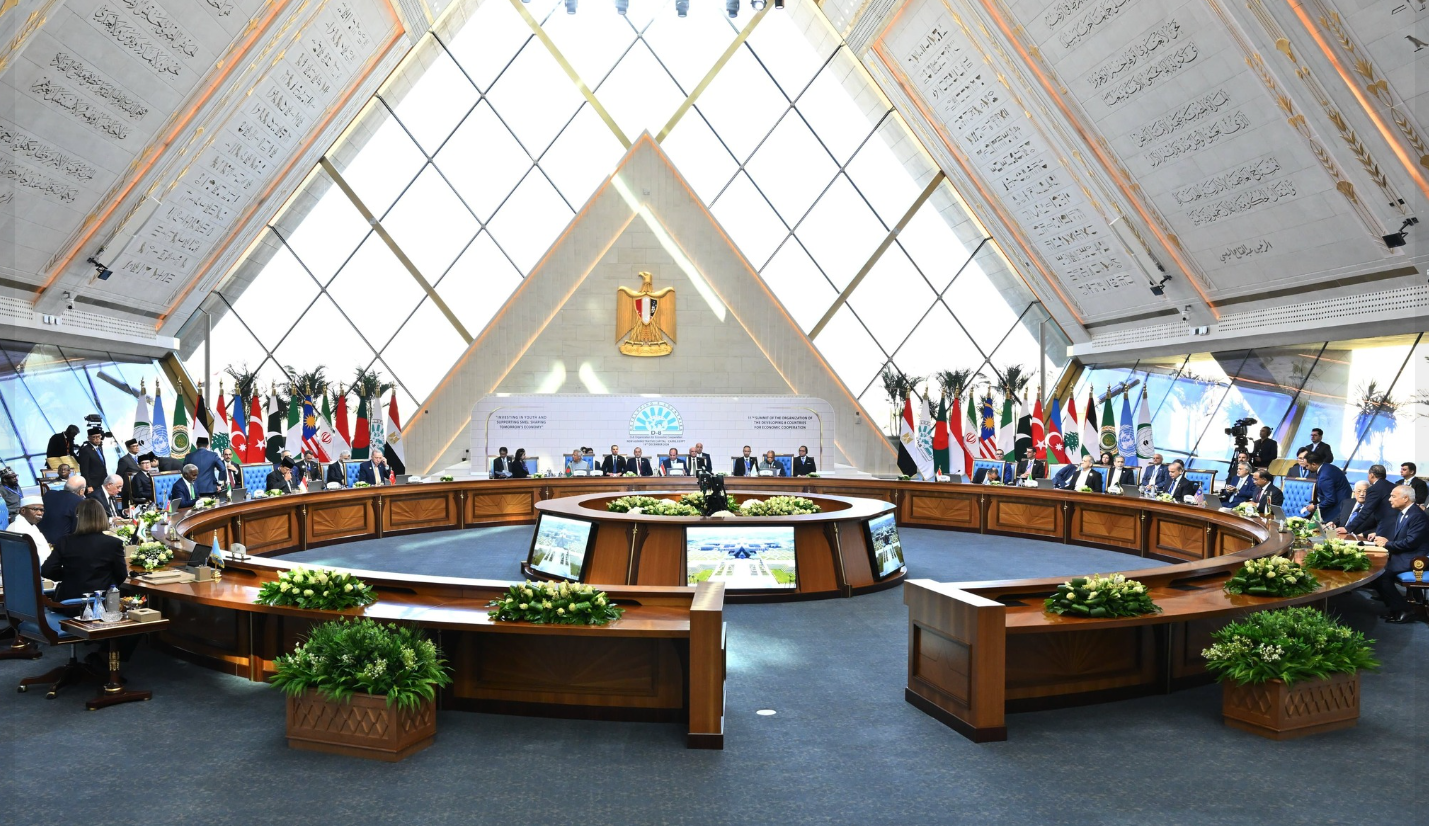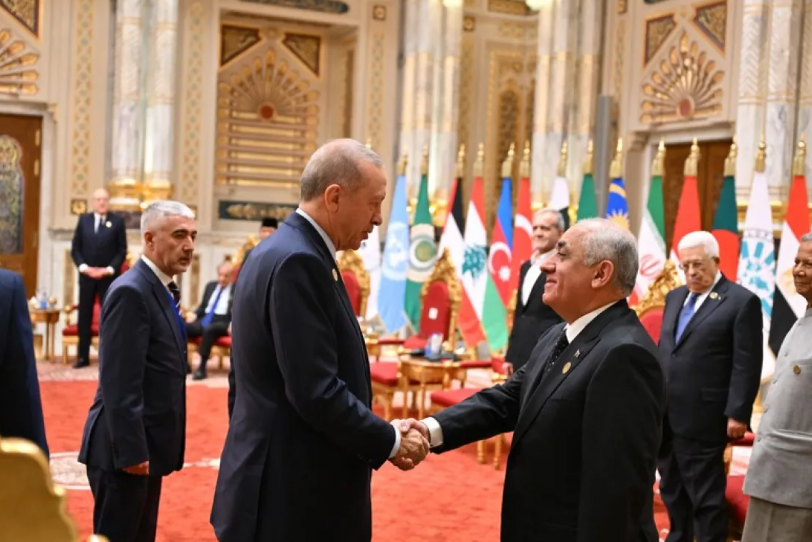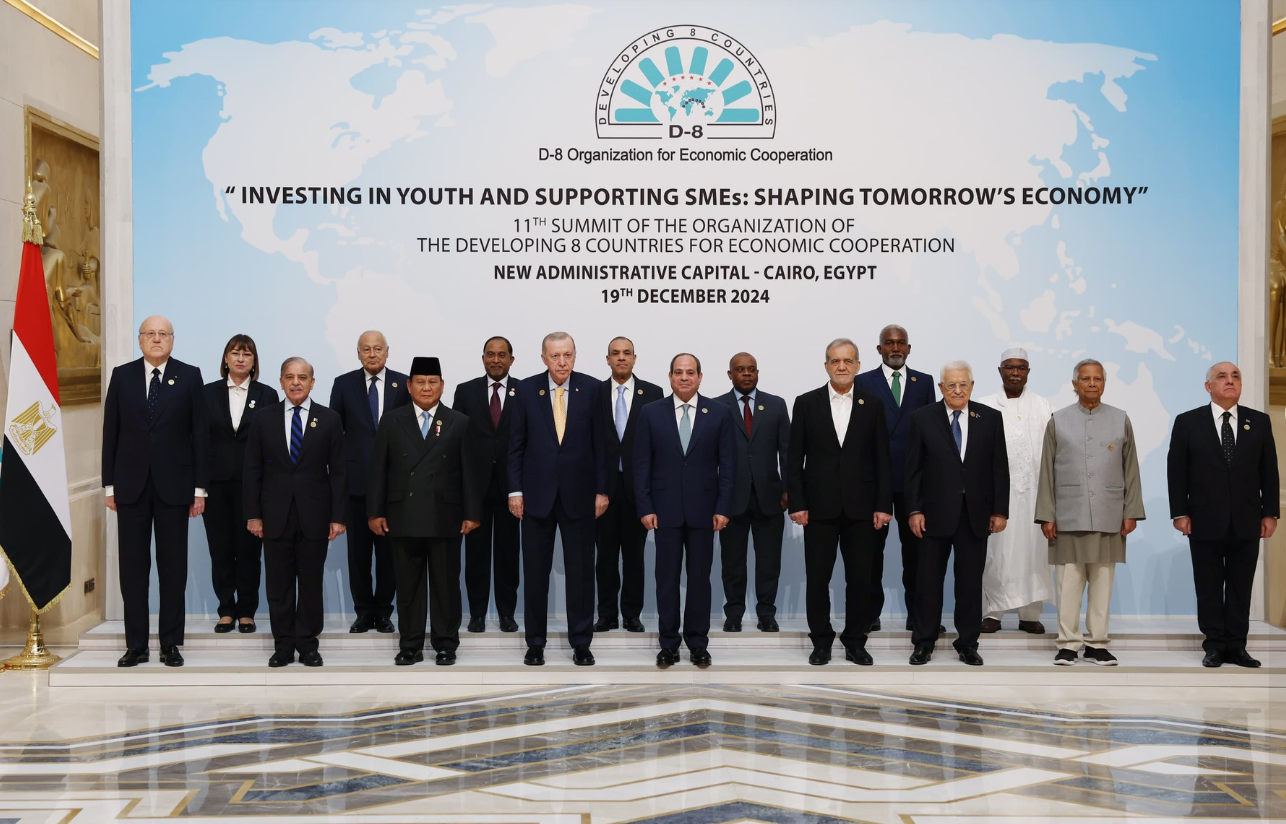The admission of Azerbaijan to the Developing-8 Organization for Economic Cooperation (D-8) in December 2024 represents a significant step for the organization, marking the first expansion since its inception. Economic potential of the D-8 and its implications for global trade, economic cooperation, and development is significant, as it unites emerging economies with vast populations and growing markets, offering opportunities for enhanced trade partnerships, investment flows, and sustainable development initiatives that can shape the future of the global economy. The D-8 countries—Bangladesh, Egypt, Indonesia, Iran, Malaysia, Nigeria, Pakistan, Turkiye, and Azerbaijan—together represent a substantial portion of the global population and economic output. Their collective growth trajectory offers valuable insights for global economic governance, trade partnerships, and sustainable development.
Economic Potential of the D-8 and Its Implications for Global Trade, Economic Cooperation, and Development
The D-8 Organization for Economic Cooperation, comprising eight diverse nations, holds significant economic potential. With Azerbaijan’s recent admission to the group, the collective economic strength of the D-8 can be leveraged to improve global trade, foster economic cooperation, and drive sustainable development. Key sectors such as energy, agriculture, textiles, technology, and infrastructure have substantial potential for growth. By focusing on these sectors, the D-8 countries can drive economic advancement within the organization and contribute to the global economy.
The economic cooperation within the D-8 offers immense potential to influence global trade, especially in energy, agriculture, textiles, technology, and infrastructure. The collective GDP of the D-8 countries stands at approximately $6.4 trillion USD (World Bank, 2023), and their combined population of 1.27 billion represents about 16% of the global population (World Bank, 2024). The group’s competitive advantage in key sectors enables it to become an important player in global trade.

The D-8 countries collectively account for nearly 5% of global trade, with significant growth potential. In 2020, trade between D-8 countries amounted to $133 billion, and the organization aims to reach $500 billion in trade by 2030 under its Decennial Roadmap. The current trade volume represents just a fraction of the potential that could be unlocked through deeper economic integration. The advantages of this expansion include access to new markets, enhanced cooperation in industrial sectors, and greater influence on global supply chains.
Azerbaijan’s inclusion in the organization complements this objective by increasing the region’s energy supply and facilitating transport routes between Asia, the Middle East, and Europe. Moreover, Azerbaijan’s expertise in energy and natural resources, coupled with its growing non-oil economy, adds a valuable dimension to the D-8’s trade landscape.
Energy Cooperation: Harnessing the Global Demand for Sustainable Energy
Energy is one of the most vital sectors within the D-8. Collectively, the member countries control significant oil and natural gas reserves, with a large portion of the world’s energy resources concentrated in this group. According to the International Energy Agency (IEA), D-8 countries collectively account for around 15% of global oil production and around 12% of global natural gas production (IEA, 2023).
Azerbaijan, for example, is a major oil producer, with a GDP of approximately $75 billion USD in 2023 (World Bank). Its vast oil and gas infrastructure, including the Caspian Sea oil fields, places Azerbaijan at the heart of the D-8's energy strategy. The growing investment in renewable energy sources, such as solar and wind, across D-8 nations further increases their potential to become leaders in sustainable energy. These countries are investing billions of dollars into energy transitions, such as the $2.6 billion USD solar power project in Pakistan (Pakistani Ministry of Energy, 2024).

Energy cooperation, especially focusing on sustainable and renewable sources, would create a more diversified energy landscape, contributing to energy security not only within the D-8 but also for global markets.
Agricultural Innovation: Securing Food and Economic Growth
Agriculture is a vital sector for many D-8 countries, with significant contributions to food security and economic development. The D-8 countries produce essential agricultural goods such as rice, wheat, cotton, palm oil, and cocoa. In 2020, agriculture contributed to approximately 11% of GDP in Indonesia and about 6% of GDP in Egypt (World Bank, 2020).
As food security becomes an increasingly urgent global issue, the D-8 nations could leverage their agricultural strength by fostering joint initiatives in sustainable farming, food processing, and agribusiness. For instance, Nigeria is the largest producer of cassava, while Malaysia is a top producer of palm oil. There are immense opportunities to enhance the region’s agricultural productivity through the adoption of technology and innovation in sustainable practices. Furthermore, the D-8 can build intra-regional trade to reduce dependency on external markets and create a more resilient food system.
The sector’s growth, particularly in food processing and value-added agriculture, could also contribute to job creation and rural development, reinforcing the D-8’s broader economic goals.
Textiles and Manufacturing: Positioning the D-8 as a Global Hub
The textiles and manufacturing sector represents another crucial opportunity for the D-8. Countries like Bangladesh, Pakistan, and Turkiye have established themselves as key players in global textile production. Bangladesh is the second-largest exporter of garments globally, contributing approximately 80% of its total exports (Bangladesh Export Promotion Bureau, 2023). Similarly, Turkiye’s textile industry, which makes up about 7% of its GDP, is known for its strong manufacturing base and quality production (Turkish Statistical Institute, 2022).
By promoting cooperation in manufacturing and textiles, the D-8 can enhance supply chain integration, reduce production costs, and boost competitiveness in global markets. The potential for expansion in manufacturing sectors, including electronics, machinery, and automotive, is also evident. In Pakistan, the automobile industry has seen steady growth, with vehicle production reaching 2.4 million units in 2023 (Pakistan Automotive Manufacturers Association, 2023). The sector is poised to benefit from greater intra-regional cooperation and expanded trade within the D-8.
Technology and Digital Economy: Building a Competitive Digital Future
The digital economy presents an exciting opportunity for D-8 countries, especially as global commerce increasingly shifts towards e-commerce, fintech, and digital services. The global e-commerce market is expected to reach $6.4 trillion by 2024, with significant growth in the D-8 countries as well (Statista, 2024).
D-8 countries are investing heavily in digital infrastructure. For example, Indonesia’s e-commerce market has grown by more than 50% since 2020, while Turkiye is home to one of the largest tech startup ecosystems in Europe (World Bank, 2023). Through collaboration, the D-8 can establish a robust digital economy, which would not only boost trade within the region but also enable these countries to compete globally in the growing tech industry. Joint initiatives in fintech and blockchain technologies, for instance, could provide cross-border payment solutions and enhance financial inclusion.
This sector will be critical for the future of global trade and economic cooperation, as technological advancements will play a central role in facilitating faster, more efficient global transactions.
Infrastructure Development: Connecting the D-8 to Global Markets
Infrastructure, particularly in transportation and logistics, is essential for enhancing intra-regional trade and connecting D-8 countries to global markets. Azerbaijan’s role as a key hub in the International North-South Transport Corridor (INSTC) links Central Asia, the Middle East, and Europe, positioning it as a gateway for goods and services moving between continents. Similarly, Turkiye's strategic location between Europe and Asia enhances its role as a critical logistics hub for trade.

Azerbaijan and Turkiye, through their complementary roles in the Middle Corridor, create a unified transport network that not only improves intra-D-8 connectivity but also opens new channels for global trade. This synergy in infrastructure development allows D-8 countries to reduce logistics costs, improve efficiency, and attract foreign investments. Moreover, enhanced connectivity and trade flow across these corridors can significantly boost the economic integration of the D-8 countries, promoting sectoral cooperation in energy, agriculture, and industry while facilitating trade agreements within the region.
The D-8 countries' joint infrastructure development can significantly improve trade efficiency by reducing transport costs, enhancing logistics, and increasing market access. Infrastructure investment in transportation reached $9.5 billion USD in Egypt in 2023, aimed at improving its ports, roads, and rail systems (Egypt Ministry of Transport, 2023). Developing these infrastructure networks will create jobs, boost industrial sectors, and increase trade flows across the region.
Azerbaijan’s recent admission to the D-8 strengthens its role in regional energy and infrastructure, while fostering greater economic integration within the organization. By enhancing cooperation in these key areas, the D-8 can bolster intra-regional trade, contribute to sustainable economic growth, and create more resilient economies, which can, in turn, benefit the global economy.
References
· World Bank (for GDP and trade data):
· International Energy Agency (IEA) (for energy statistics):
- https://www.iea.org/reports/world-energy-outlook-2023
· Statista (for e-commerce data):
- https://www.statista.com/statistics/379046/e-commerce-sales-worldwide/
· Bangladesh Export Promotion Bureau (for export data):
· Pakistan Automotive Manufacturers Association (for automobile production data):
· Egypt Ministry of Transport (for infrastructure investments):





Most readed news
"Azexport" portal held a meeting at AzTU on "International e-commerce platforms…
A discussion was held on the monitoring of the State Program on the Geological Study of the…
The awarding ceremony of the winners of the "GIS-Tech Marathon 2025" took place…
The first meeting on simplifying air transportation formalities was held at CAERC
Azerbaijan-Iran relations: from the past to the future
Employees of the "Enterprise Azerbaijan" portal met with a professor from Stanford…
An info session was held at Baku State University as part of the "Startup School 3"…
Call for co-authors “Turkic States: Rising Investment Powerhouses” Book
The Head of the TWRC delivered a presentation at an international conference in Tashkent
The "Startup School 3" project was discussed